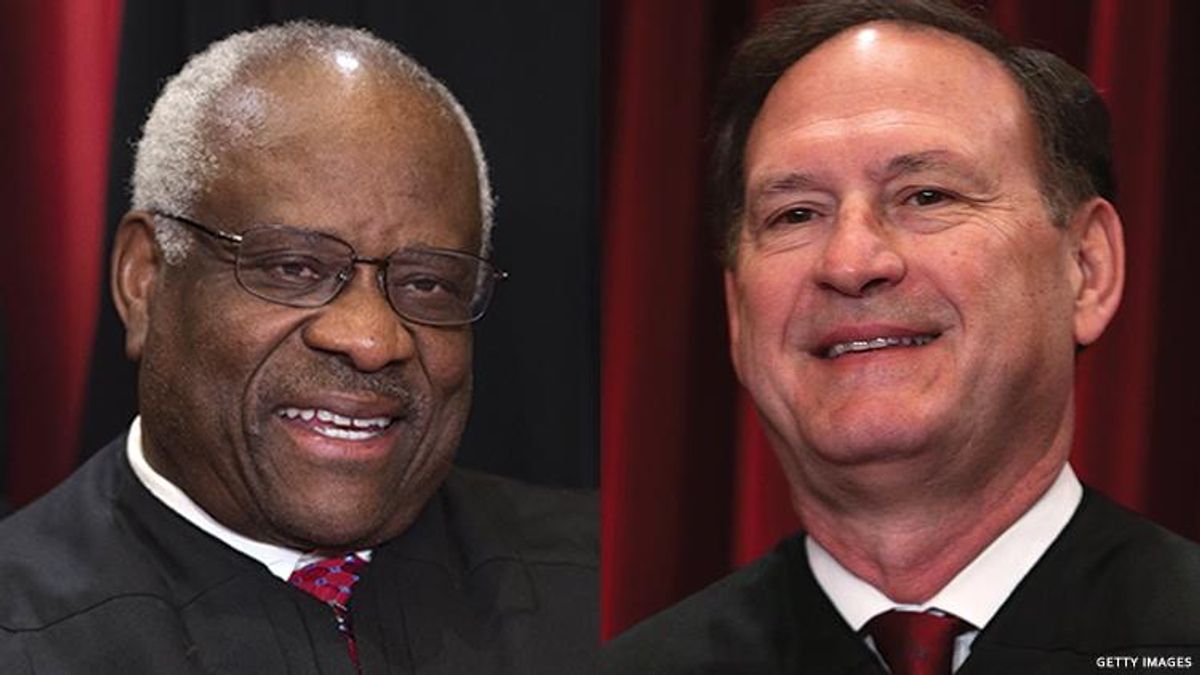Last fall, Justices Samuel Alito and Clarence Thomas opened the Supreme Court's term by calling for the overturning of its 2015 ruling that established marriage equality nationwide. They're now part of a 6-3 conservative majority on the court since Donald Trump got three nominees confirmed by the Senate. The situation gives LGBTQ+ Americans cause for concern, even amid optimism brought on by the election of a Democratic president who has majority support in the House and Senate. But just how much worry is warranted?
Right now no case that would actually overturn the Obergefell v. Hodges marriage equality ruling is making its way through the lower courts. But the statements by Alito and Thomas basically invite one.
The imminent danger, civil rights lawyers say, is that the court could chip away at marriage equality -- leaving same-sex couples able to have their marriages legally recognized but unable to access some of the rights and responsibilities that traditionally came with it.
"Our opponents are actively working to strip away the rights that LGBTQ people have," says Alphonso David, president of the Human Rights Campaign and the first civil rights lawyer to head the organization.
Many of these efforts involve religious objections to LGBTQ+ equality. One such case that the court heard last fall and will rule on this spring involves whether a government entity can make its contractors adhere to antidiscrimination law.
That case, Fulton v. City of Philadelphia, arose after the Philadelphia Department of Human Services, which operates the city's foster care system, ended its contract with Catholic Social Services because the agency would not certify same-sex couples as foster parents -- therefore violating Philadelphia's antidiscrimination ordinance.
The Catholic agency and three foster parents sued, saying they should still be able to work with the city while adhering to their religious tenets against same-sex marriage. The city's action, they argued, conflicted with the First Amendment's guarantee of religious freedom.
Catholic Social Services has lost at the trial court and appeals court levels, but how the Supreme Court will rule is anybody's guess. During oral arguments, Alito and some other conservative justices, notably Trump appointees Brett Kavanaugh and Amy Coney Barrett, appeared to sympathize with the group's position. (Thomas is generally silent during court proceedings.)
Nonetheless, "there's a very strong argument that Philadelphia should prevail," says Mary Bonauto, an attorney with GLBTQ Legal Advocates and Defenders, who argued the Obergefell case. Part of that argument is that it's not acceptable to violate a contract, and Chief Justice John Roberts, although part of the court's conservative wing, seemed to pick up on that, she says. Alternatively, she says, the court could craft a very narrow ruling giving Catholic Social Services an exemption from the law without establishing a broad right to discriminate.
There will be other attempts to chip away at marriage equality in the name of religion. Opponents of LGBTQ+ equality have been encouraged by Trump's appointments of conservatives to not only the Supreme Court but to lower federal courts. "They clearly feel like they're working with a home-court advantage," says Sharon McGowan, chief strategy officer and legal director for Lambda Legal.
There are also reasons for cautious optimism. Neil Gorsuch, the first Supreme Court justice appointed by Trump, delivered a pleasant surprise last summer by writing the ruling in Bostock v. Clayton County, which held that existing law against sex discrimination in the workplace applies to sexual orientation and gender identity as well. Roberts joined in that 6-3 ruling.
In December, the court declined to hear a case in which the state of Indiana sought to reverse a lower court's ruling that both same-sex parents have to be listed on a child's birth certificate. The high court had already ruled on the matter, in favor of same-sex parents, in a case from Arkansas.
But Bonauto and others have seen many challenges to equal rights and expect to see more. Panic isn't warranted, but vigilance is. David notes, "I am certainly pleased that the court is reaffirming the rights of LGBTQ people, but we cannot become complacent."
These legal advocates say they're poised to stand up to the challenges, while adding that there are things everyone can do, particularly standing up and speaking out for LGBTQ+ rights everywhere. This includes pointing out that exercising one's religious faith doesn't mean one can trample on other people's constitutional rights -- and that not all people of faith are homophobic and indeed, many of them are members of the LGBTQ+ community.
It also includes emphasizing the joy and the protection that marriage equality has brought LGBTQ+ people and their families. That was evident as couples tied the knot right after the Obergefell ruling and continues to be today, Bonauto says.
"Whether you want to get married or not," she says, "you can see that it's made a lot of people happy and more secure."












































































